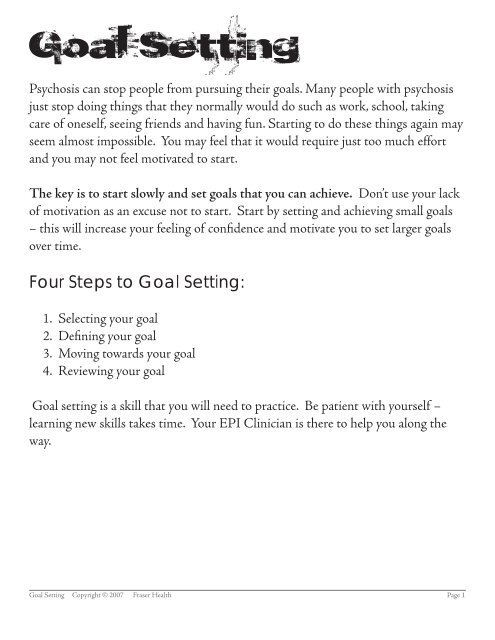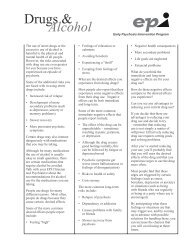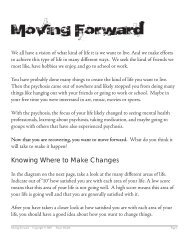Goal Setting - Psychosis Sucks
Goal Setting - Psychosis Sucks
Goal Setting - Psychosis Sucks
Create successful ePaper yourself
Turn your PDF publications into a flip-book with our unique Google optimized e-Paper software.
<strong>Goal</strong> <strong>Setting</strong><strong>Psychosis</strong> can stop people from pursuing their goals. Many people with psychosisjust stop doing things that they normally would do such as work, school, takingcare of oneself, seeing friends and having fun. Starting to do these things again mayseem almost impossible. You may feel that it would require just too much effortand you may not feel motivated to start.The key is to start slowly and set goals that you can achieve. Don’t use your lackof motivation as an excuse not to start. Start by setting and achieving small goals– this will increase your feeling of confidence and motivate you to set larger goalsover time.Four Steps to <strong>Goal</strong> <strong>Setting</strong>:1. Selecting your goal2. Defining your goal3. Moving towards your goal4. Reviewing your goal<strong>Goal</strong> setting is a skill that you will need to practice. Be patient with yourself –learning new skills takes time. Your EPI Clinician is there to help you along theway.<strong>Goal</strong> <strong>Setting</strong> Copyright © 2007 Fraser Health Page 1
1. Selecting your goalStart with smaller goals that you are likely to achieve within the next week. Thiswill help you learn good goal setting skills. After success with a few smaller goals,you can try your skills with larger goals.Your EPI Clinician can help you in selecting a goal but the goal that you decide onshould be your own - it should be something that you really want.<strong>Goal</strong> <strong>Setting</strong> can be useful for:• Taking care of your health – such as losing weight, exercising regularly andquitting smoking• Pursuing dreams – such as goals for school, work, travel and family• Fun activities – such as hobbies, sports and recreation• Carrying out a plan for a solution to a problem (via the problem solvingmethod)<strong>Goal</strong> <strong>Setting</strong> Copyright © 2007 Fraser Health Page 2
2. Defi ning your goalThe best goals are specific, scheduled, supported and realistic.SpecificBe as specific as you can in defining your goal. A goal such as “get more exercise” isnot specific. It doesn’t tell you exactly how this goal will be accomplished. A morespecific way to write this goal would be to state “go for a 30-minute bike ride at thepark on Monday, Wednesday and Saturday”.ScheduledSchedule your goal by answering the following questions:• Exactly when will I do this? What days and at what time?• How long will I do this for? 10 minutes or one hour each time?• Where will I do this? In my house, at the park or at the community centre?SupportedThink about who can support you and how they will do this. Types of support youmay need include getting help finding out information, having somebody remindyou, or help with transportation.RealisticDon’t make your goal too difficult. You want to set a goal that is slightly out ofreach but achievable with a bit of effort.<strong>Goal</strong> <strong>Setting</strong> Copyright © 2007 Fraser Health Page 3
<strong>Goal</strong> <strong>Setting</strong> Worksheet<strong>Goal</strong> How often When exactly Who willsupport me<strong>Goal</strong> <strong>Setting</strong> Copyright © 2007 Fraser Health Page 4
3. Moving towards your goalNow it’s time to take action and move towards your goal. You’ll want to track yourprogress.The best way to track your progress is by using a calendar or day planner. You canwrite down your schedule for your goal and check it off each time you’ve done it.If you miss a scheduled time for whatever reason, then reschedule this for anothertime.4. Reviewing your goalAs you are working toward your goal, review your progress regularly. Sometimesyou may find that you have not made any progress toward your goal. If that’s thecase, don’t blame yourself. There are no failures in goal setting – just redefining thegoal and the steps you are taking to get there.You should expect to revise your goals especially when first starting to practicethis skill. It is challenging to set goals at the right level of difficulty and only withpractice will you get better at this.<strong>Goal</strong> <strong>Setting</strong> Copyright © 2007 Fraser Health Page 5






